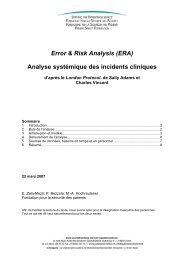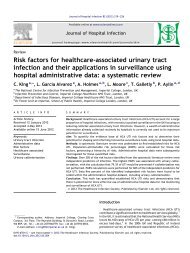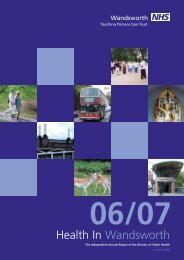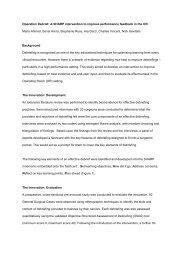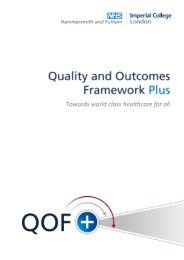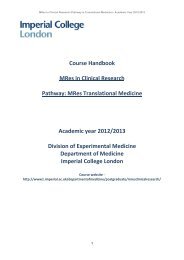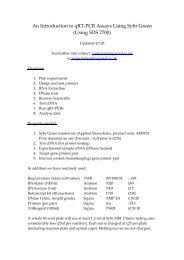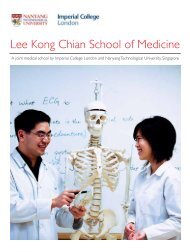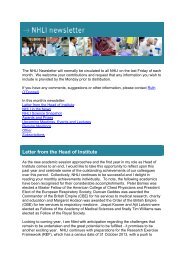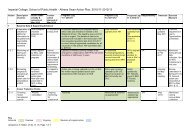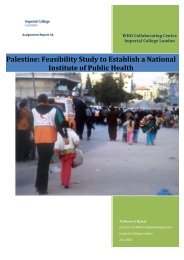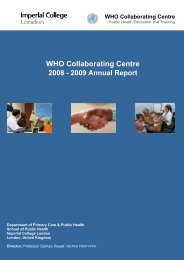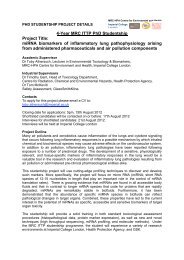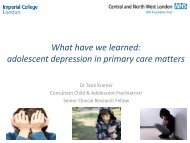NHLI Athena SWAN Action Plan - Imperial College Faculty of Medicine
NHLI Athena SWAN Action Plan - Imperial College Faculty of Medicine
NHLI Athena SWAN Action Plan - Imperial College Faculty of Medicine
Create successful ePaper yourself
Turn your PDF publications into a flip-book with our unique Google optimized e-Paper software.
<strong>NHLI</strong> <strong>Athena</strong> <strong>SWAN</strong> Application<strong>Action</strong> <strong>Plan</strong> – May 2009A) Introduction<strong>NHLI</strong> aligns itself to the aims <strong>of</strong> the <strong>Athena</strong> <strong>SWAN</strong> Charter by wishing to retain and attractthe brightest women in cardiovascular and respiratory science, irrespective <strong>of</strong> grade. Itwishes to recruit new female academics in basic and clinical sciences at lecturer level andbeyond.This <strong>Action</strong> <strong>Plan</strong> was developed with this goal in mind. <strong>NHLI</strong> wishes to increase retentionwhere attrition is occurring, to increase entry where recruitment is deficient, and to improvethe quality <strong>of</strong> work and training environments and career development for all women at alllevels.Beyond the actions to ensure continuity <strong>of</strong> fairness <strong>of</strong> process for those women who doapply for posts, the Division will explore the affirmative steps that could be taken to raiseits pr<strong>of</strong>ile as a female-friendly workplace and solicit more and better applications fromwomen.The Divisional plan also recognises the importance <strong>of</strong> communications and the difficulties<strong>of</strong> ensuring these are effective within such a large and geographically widespread division.<strong>NHLI</strong> <strong>Athena</strong> <strong>SWAN</strong> Application – <strong>Action</strong> <strong>Plan</strong> 1
2.2.4. ‘Women in ClinicalAcademia’ Day<strong>Faculty</strong> Research Theme Leaders (BillCookson & Michael Schneider)Cardiovascular Lead(tbc)Respiratory Lead(tbc)Co-ordinated with 1.1.Launch 20103.1. Academic Mentors Head <strong>of</strong> Division(Michael Schneider)Associate Head <strong>of</strong> Division(Bill Cookson)Deputy Divisional Managers(Richard Mattin & Carol-Anne Shaw)Divisional Lead for Women(Clare Lloyd)Learning and Development CentreCentre for Educational DevelopmentHuman ResourcesResearch & informationgathering – winter 2009Launch 20113.2. Interim Pr<strong>of</strong>essionalDevelopment Day4.1. Communications andInformation4.1.1. <strong>NHLI</strong> InductionInformation Pack4.1.2. Improved Divisional StaffCommunications4.1.3. <strong>NHLI</strong> <strong>Athena</strong> AnnualReportHead <strong>of</strong> Division(Michael Schneider)Associate Head <strong>of</strong> Division(Bill Cookson)Divisional Lead for Women(Clare Lloyd)Learning and Development CentreCentre for Educational DevelopmentCareers Advisory ServiceDeputy Divisional Managers(Richard Mattin & Carol-Anne Shaw)Research Managers(Alun Owen & Emma Watson)Human Resources Manager(Siobhain Griffin)Head <strong>of</strong> Division(Michael Schneider)Associate Head <strong>of</strong> Division(Bill Cookson)Group, Section Administrators & PAs(Various)<strong>Athena</strong> Lead(Clare Lloyd)<strong>Athena</strong> Administrator(Emma Watson)Launch Autumn 2009OngoingJanuary 2010Summer 20092010<strong>NHLI</strong> <strong>Athena</strong> <strong>SWAN</strong> Application – <strong>Action</strong> <strong>Plan</strong> 3
4.2. Committees andManagement Roles4.3. Visibility <strong>of</strong> AcademicWomen5.1. Elsie WiddowsonFellowshipsHead <strong>of</strong> Division(Michael Schneider)Associate Head <strong>of</strong> Division(Bill Cookson)Divisional Lead for Women(Clare Lloyd)Committee Chairpersons(Various)Senior Academic Staff(Various)Audio Visual Technician(Tony Rocha)BHF Centre <strong>of</strong> Research ExcellenceManager(Katie Payne)Research Manager(Emma Watson)Centre for Respiratory Infection Manager(Lindsey-Anne Cumming)Course Administrators(Various)Divisional Lead for Women(Clare Lloyd)Deputy Divisional Managers(Richard Mattin & Carol-Anne Shaw)Section Administrators(Various)Autumn 2009 with regularreviewsOngoingMay 20095.2. Flexible Working Divisional Lead for Women(Clare Lloyd)Heads <strong>of</strong> Sections(Various)Deputy Divisional Managers(Richard Mattin & Carol-Anne Shaw)Section Administrators(Various)October 2009 with yearlyreview5.3. Postdoctoral TravelAwards including CaringResponsibilitiesResearch Manager(Emma Watson)PostDoc Committee(Various)September 2009<strong>NHLI</strong> <strong>Athena</strong> <strong>SWAN</strong> Application – <strong>Action</strong> <strong>Plan</strong> 4
C) <strong>Action</strong> <strong>Plan</strong>1. The Fundamentals for Success• The Base line for <strong>Action</strong>, Evidence and Data• Taking <strong>Action</strong>, Leadership, Resources and Accountability1.1. Women in Clinical Academic <strong>Medicine</strong>There is such a problem worldwide in recruiting and retaining female clinical academicsthat a ‘Women in Clinical Academia’ working group, which includes <strong>Imperial</strong>, wasestablished. This group will examine barriers, real or perceived, to the career progression<strong>of</strong> women working in clinical academic medicine and dentistry (Reference: MedicalSchools Council, http://www.medschools.ac.uk/women.htm).Similarly, the <strong>Faculty</strong> Ambassador for Women and Divisional Leads aim to researchexisting roadblocks for women in clinical academia. This research will include organisingan informal networking meeting for female clinical academics who will be invited to sharetheir experiences (summer 2009).<strong>NHLI</strong>, in conjunction with the <strong>College</strong>, wants to increase the representation <strong>of</strong> femaleclinical academic within the Division. The Division will be represented by Pr<strong>of</strong>essor ClareLloyd (Divisional Lead for Women and <strong>Athena</strong> Lead) and Pr<strong>of</strong>essor Maria Belvisi (<strong>Faculty</strong>Ambassador for Women) who will encourage female clinical academics to take part in theresearch. <strong>NHLI</strong> also hosts two <strong>Faculty</strong> Research Theme Leaders, namely Pr<strong>of</strong>essorMichael Schneider (Cardiovascular Research Theme Leader and Head <strong>of</strong> Division) andPr<strong>of</strong>essor Bill Cookson (Respiratory Research Theme Leader and Associate Head <strong>of</strong>Division), who will advise on their particular scientific theme.<strong>NHLI</strong>’s specific goal is to increase the proportion <strong>of</strong> women in cardiology and respiratoryacademia. It has already established several specific action plans linked to this goal (2.2.)and will aim to address clinical women’s roadblocks when these are identified.1.2. Monitoring <strong>of</strong> Studentship Applications and RecruitmentStudent recruitment to <strong>NHLI</strong>’s divisional programmes <strong>of</strong> study is currently monitoredcentrally by the Division and includes monitoring for gender equality. Applications to theseprogrammes show gender balance and monitoring has not identified a problem. <strong>NHLI</strong>expects that this will continue to be the case.However, the Division aims to roll out this monitoring to all studentships throughout theDivision to ensure equality <strong>of</strong> all applications and identify any areas <strong>of</strong> inequality.This will be led through <strong>NHLI</strong>’s Postgraduate Office (Emma Watson, Research Managerand Clodagh Li, Postgraduate Administrator) and will require <strong>NHLI</strong> staff to complete aquestionnaire following each recruitment. It will be supported by the Director <strong>of</strong>Postgraduate Studies (Pr<strong>of</strong>essor Jane Mitchell).This initiative will be trialled over summer <strong>of</strong> 2009 and launched in October 2009 for anyfuture recruitments.<strong>NHLI</strong> <strong>Athena</strong> <strong>SWAN</strong> Application – <strong>Action</strong> <strong>Plan</strong> 5
2. Key Career Transition Points• Appointment and Promotion Processes• <strong>Action</strong> to level the Appointment and Promotion Playing Fields2.1. Increase Communication <strong>of</strong> the Promotion Process<strong>NHLI</strong>’s data suggests that female academics are both being put forward and promoted andpromoted at a similar rate as male academics within the Division. However, workshopsand discussion with staff acknowledged that the promotion process has been perceived bysome members <strong>of</strong> staff as poorly communicated by the <strong>College</strong>.<strong>NHLI</strong> must abide by <strong>Imperial</strong>’s promotion process but it will continue to ensure that allmembers <strong>of</strong> staff, both <strong>Imperial</strong> employees and those holding honorary contracts, areaware <strong>of</strong> the promotion process and its timetable.Introduction <strong>of</strong> the Interim Pr<strong>of</strong>essional Development Day (3.2.) and Academic Mentors(3.1.) scheme will further highlight the promotion process to all members <strong>of</strong> staff.2.2. Increase Recruitment <strong>of</strong> Female Scientists<strong>NHLI</strong> will encourage the recruitment <strong>of</strong> new female academics, both clinical and nonclinical.Beyond ensuring the fairness <strong>of</strong> process for those women who do apply, it willdevelop affirmative action that could be taken to solicit more and better applications fromwomen. For clinical academic appointments this will be coordinated with 1.1. above.It is an accepted fact that female cardiovascular clinical academics are less representedwithin clinical academia and thus specific attention will be taken to increasing femalecardiovascular clinical academics (http://www.theheart.org/article/513191.do).2.2.1. Increase Outreach Activities to School PupilsIncreasing female clinical academic staff representation does not rely solely on ensuringopportunities for female clinical academics are available. It also requires ensuring thatfemale pupils choose clinical academia as a life career.<strong>NHLI</strong> therefore aims to increase its outreach activities to school pupils, informing them <strong>of</strong>the opportunities that are available to them and sharing with them <strong>NHLI</strong>’s excitement formedical research, both as basic and clinical scientists. <strong>NHLI</strong> will ensure that bothrespiratory and cardiovascular sciences are represented.2.2.2. Monitor and Increase Participation <strong>of</strong> BSc’sThe data has shown that female participation in the respiratory BSc year <strong>of</strong> the <strong>College</strong>’sMBBS programme is equal to male participation. However, it is clear that at this level,female students are already starting to avoid cardiovascular science as a topic.<strong>NHLI</strong> <strong>Athena</strong> <strong>SWAN</strong> Application – <strong>Action</strong> <strong>Plan</strong> 6
<strong>NHLI</strong> aims to increase the representation <strong>of</strong> female students on the cardiovascular BSc byengaging with students during their three preceding years and therefore prior to choosingtheir BSc topic.<strong>NHLI</strong> will research the most appropriate way <strong>of</strong> engaging with these students, which couldbe through a series <strong>of</strong> lectures or through an open day.<strong>NHLI</strong> will continue to monitor female participation on the respiratory BSc and ensurecontinuity <strong>of</strong> gender parity.This will be led by <strong>NHLI</strong>’s Director <strong>of</strong> Undergraduate Studies (Sue Smith) and could belaunched as soon as the new academic year (October 2009) depending on the results <strong>of</strong>the research and availability <strong>of</strong> timetabling.2.2.3. Increase Recruitment <strong>of</strong> Clinical Research Fellows<strong>NHLI</strong>’s data show that clinical research fellows (CRF) follow the trend <strong>of</strong> parity withinrespiratory science and are under-represented within cardiovascular sciences.<strong>NHLI</strong>’s Clinical Research Fellow initiative aims to attract more cardiovascular andrespiratory CRFs to <strong>NHLI</strong> to undertake research degrees. The initiative includes raisingthe pr<strong>of</strong>ile <strong>of</strong> the Division within the nation’s training fellow community through attendanceand presentations at conferences and training days and optimising the research entryprocess (project and supervisor choices, funding applications, etc).In particular, the initiative will target female cardiovascular trainees to actively recruit themto <strong>NHLI</strong> and provide them with the training that will form the basis <strong>of</strong> their clinical academiccareer.The initiative was trialled in February 2009 with a presentation to North West ThamesRespiratory Trainees, which was very successful. It will be launched more formallythrough <strong>NHLI</strong>’s attendance at the British Cardiovascular Society conference and annualmeeting on 1, 2, 3 rd June 2009. <strong>NHLI</strong> has also already applied to the British ThoracicSociety to attend its meeting and conference in December 2009.The initiative is led by <strong>NHLI</strong>’s Research Manager and Director <strong>of</strong> Postgraduate Studies inconjunction with a respiratory and a cardiovascular lead.2.2.4. ‘Women in Clinical Academia’ Day<strong>NHLI</strong> will set up a ‘Women in Clinical Academia’ day and ensure participation <strong>of</strong> its clinicalfemale academics. These days will be tailored for both respiratory and cardiovascularclinical academics as both specialties will present different roadblocks which must bebroken down.This will be organised following the results <strong>of</strong> the research from 1.1. and will be led by theCardiovascular and Respiratory <strong>Faculty</strong> Research Theme Leaders.<strong>NHLI</strong> <strong>Athena</strong> <strong>SWAN</strong> Application – <strong>Action</strong> <strong>Plan</strong> 7
3. Career Development – Provision, Support and Encouragement• The Provision <strong>of</strong> Career Development• Career Development Activities3.1. Academic Mentors<strong>NHLI</strong> has worked extensively towards the development <strong>of</strong> research trainees at degree andpostdoctoral levels, having identified these career stages as being critical in retaining anddeveloping the best staff. It has worked in line with the Graduate Schools and theLearning and Development Centre to provide a structure <strong>of</strong> mentoring and careerdevelopment for each research student (including clinical research fellows) andpostdoctoral scientist (See section 2(ii) <strong>of</strong> the <strong>NHLI</strong> Application).<strong>NHLI</strong> has recognised that structured, constructive mentoring should not be limited totrainees and should also be available to academic staff. It was clear from discussions withstaff throughout <strong>NHLI</strong> (Open Forums and <strong>Athena</strong> Workshops) that there was a need and awish to have similar structures for academic staff.<strong>NHLI</strong> will therefore introduce a structure <strong>of</strong> academic mentors throughout the Division.This mentoring system will be separate from any probationary scheme and will bestructured in order that support and training is available for both mentors and mentees withrecommendations such as time commitments and proposed outcomes.<strong>NHLI</strong> will monitor participation to ensure a balanced workload for mentors, ensuring quality<strong>of</strong> the mentorship and preventing the detriment <strong>of</strong> their own career development.Importantly, <strong>NHLI</strong> will gather feedback and monitor the programme as a whole ensuringthat it is effective and fulfils its aims.This scheme to be led by the Head and Associate Head <strong>of</strong> Division, supported by theDivisional Lead for Women and Divisional Administration Staff. It will require input fromother departments throughout <strong>Imperial</strong> such as the Learning and Development Centre, theCentre for Pr<strong>of</strong>essional Development and Human Resources.The Division aims for the scheme to be implemented by summer 2011, following theresearch into and establishment <strong>of</strong> the scheme starting summer 2009.3.2. Interim Pr<strong>of</strong>essional Development DayThe introduction <strong>of</strong> <strong>NHLI</strong>’s academic mentoring scheme will take research, planning andstructuring prior to its launch.However, <strong>NHLI</strong> also wishes to address the need for academic staff pr<strong>of</strong>essionaldevelopment in the short term, while the mentoring scheme is established.The Division will therefore set up a series <strong>of</strong> interim pr<strong>of</strong>essional development days,available to all <strong>NHLI</strong> academic staff and providing a confidential and voluntary service,facilitating career planning and pr<strong>of</strong>essional development.<strong>NHLI</strong> <strong>Athena</strong> <strong>SWAN</strong> Application – <strong>Action</strong> <strong>Plan</strong> 8
This scheme will be led by the Head <strong>of</strong> Division and Associate Head <strong>of</strong> Division, supportedby the Divisional Lead for Women and Divisional Administration Staff. It will also requireinput from other departments throughout <strong>Imperial</strong> such as the Learning and DevelopmentCentre, the Centre for Pr<strong>of</strong>essional Development and Human Resources.<strong>NHLI</strong> aims to set up the first such day at the beginning <strong>of</strong> the new academic year, fromOctober 2009.<strong>NHLI</strong> <strong>Athena</strong> <strong>SWAN</strong> Application – <strong>Action</strong> <strong>Plan</strong> 9
4. Organisation and Culture• Management Ethos, Structures and Decision Making• Organisational Values, Communications and Culture4.1. Communications and InformationWith its geographical spread and size, <strong>NHLI</strong> has suffered from communication difficulties;an issue it has worked on addressing for several years.Thus, communications and information provision within <strong>NHLI</strong> has increased significantlyover the last few years. <strong>NHLI</strong> launched its monthly newsletter in 2007 following workshopswith academic staff who had voiced concern over the provision disparity <strong>of</strong> someinformation. The newsletter is sent to all staff and students within <strong>NHLI</strong>, including thosestaff holding honorary contracts, staff on parenting leave, etc.Further initiatives will be put in place to continue to increase communications andinformation provision within the Division.Documents will be reviewed by the Divisional Lead for Women prior to their launch.4.1.1. <strong>NHLI</strong> Induction Information PackFollowing discussion workshops, it was revealed that new members <strong>of</strong> staff cansometimes feel isolated within their research group. Whilst information on what <strong>NHLI</strong>support structures exist can be found on <strong>NHLI</strong> and <strong>Imperial</strong>’s websites, it can be difficult t<strong>of</strong>ind if you don’t know where to look or don’t know that it is available.<strong>NHLI</strong> has therefore decided to customise its induction process by providing all members <strong>of</strong>staff with an <strong>NHLI</strong> specific induction information pack which will be added to the <strong>College</strong>’sstarter pack for new staff.This information pack will include information regarding the structure <strong>of</strong> the Division, bothscientifically and administratively and a guide on who’s who within the Division. The who’swho guide will include key roles such as the Divisional Lead for Women, the Director <strong>of</strong>Postgraduate Studies and leads for the <strong>Athena</strong> <strong>Action</strong> <strong>Plan</strong>. It will also include keyadministration roles such as <strong>NHLI</strong>’s Research Managers, Divisional Manager and DeputyDivisional Managers.Upon completion, the information will be sent electronically to all current staff, ensuringthat they are also kept up-to-date.The information pack will be put together by the Research Managers and DeputyDivisional Managers with support from human resources and is expected to be ready byJanuary 2010. It will then be distributed by human resources within new staff packs.<strong>NHLI</strong> <strong>Athena</strong> <strong>SWAN</strong> Application – <strong>Action</strong> <strong>Plan</strong> 10
4.1.2. Improved Divisional Staff CommunicationsOpportunities such as flexible working, pr<strong>of</strong>essional development events and postdoctoraltravel awards are listed in <strong>NHLI</strong>’s Newsletter and Funding Bulletin. How this information isthen cascaded out can vary, for example some group or section administrators discussrelevant items during group or section meetings.<strong>NHLI</strong> will re-enforce its policies, particularly in respect <strong>of</strong> items highlighted in workshopsand the <strong>Athena</strong> Application, through the <strong>NHLI</strong> Newsletter, its Deputy Divisional Managersand group and section administrators. <strong>NHLI</strong> will also interact with academics’ personalassistants.4.1.3. <strong>NHLI</strong> <strong>Athena</strong> Annual Report<strong>NHLI</strong> will put together an <strong>Athena</strong> Annual Report which will describe its activities towardsthe recruitment, training and retention <strong>of</strong> female academics. It will showcase the progress<strong>of</strong> its <strong>Action</strong> <strong>Plan</strong>, staff achievements and will be used as a tool for the recruitment <strong>of</strong> newfemale investigators, additional to generic and scientific literature and recruitment tools.This report will be led by the <strong>Athena</strong> Lead and Administrator and will be annual with thefirst planned for summer 2010.4.2. Committees and Management RolesWomen represent 33% <strong>of</strong> overall academic staff, however, <strong>NHLI</strong>’s data showed that some<strong>of</strong> <strong>NHLI</strong>’s committees had a lower representation from female staff in comparison tooverall female staff, whilst other showed over-representations and thus potentialcommittee overload. The lower representation is noticeable for committees which includeclinical or cardiovascular scientists, but is similar to staff distribution in those fields.The Division will ensure the appropriate representation <strong>of</strong> women on committees and inkey divisional management roles (e.g. Director <strong>of</strong> Postgraduate Studies, Tutors, IT, Health& Safety, Divisional Advisory Group, Heads <strong>of</strong> Sections). It will also include anyappropriate rotation <strong>of</strong> key positions and committee memberships.This will be led by the Head <strong>of</strong> Division, Associate Head <strong>of</strong> Division in conjunction withcommittee chairpersons, senior academic staff and will be ongoing.4.3. Visibility <strong>of</strong> Academic WomenThe Division will increase the visibility <strong>of</strong> its women scientists in all <strong>NHLI</strong> communications.This will include pictorial visibility as well as textual and will include its website, the BHFCentre <strong>of</strong> Research Excellence literature and website, literature associated with theClinical Research Fellow initiative (2.2.3.).<strong>NHLI</strong> will continue to encourage female staff to update their Personal WebPages andprovide technical and writing support for those who require it. The Division will invitefemale staff to sign up to the <strong>College</strong>’s Expert Directory for media appearances and to join<strong>NHLI</strong> <strong>Athena</strong> <strong>SWAN</strong> Application – <strong>Action</strong> <strong>Plan</strong> 11
the GetSET database run by the UK Resource Centre for Women in SET (mediaappearances, public appointments, etc).Staff responsible for this will vary across the Division and will include the CourseOrganisers, Research Managers, BHF Centre <strong>of</strong> Research Excellence Manager, Centrefor Respiratory Infection Manager and AV Technician (who has responsibility over <strong>NHLI</strong>’swebsite).<strong>NHLI</strong> <strong>Athena</strong> <strong>SWAN</strong> Application – <strong>Action</strong> <strong>Plan</strong> 12
5. Flexibility across the Working Day, Working Year and Working Life• Career Breaks and Returning• Flexible working5.1. Elsie Widdowson FellowshipsThe Elsie Widdowson Fellowship Scheme enables female academics to return frommaternity or adoption leave and concentrate solely on research for a year in a way that fitsin most easily with family obligations.Whilst these fellowships are a <strong>College</strong> led initiative, <strong>NHLI</strong> has listed the scheme as an itemin its <strong>Action</strong> <strong>Plan</strong> as it was learnt that most staff, academic and administrative, wereunaware <strong>of</strong> its existence.<strong>NHLI</strong> supports this scheme and will ensure that it is discussed with any female academictaking maternity or adoption leave.This action plan item has already been launched. In May, <strong>NHLI</strong> approached one <strong>of</strong> itsacademic female staff who was about to take adoption leave. An application for an ElsieWiddowson fellowship is currently being drafted in conjunction with <strong>NHLI</strong> to be sent withinthe next couple <strong>of</strong> weeks.This action will be led by the Divisional Lead for Women, supported by the DeputyDivisional Managers and group and section administrators.5.2. Flexible WorkingDiscussion with staff during and following <strong>NHLI</strong>’s workshops revealed that uptake <strong>of</strong>flexible working within the Division is currently dependent on individual line managers,sections or groups.The Division aims to ensure that this is communicated thoroughly. The Head <strong>of</strong> Divisionhas already strongly expressed his support during the recent <strong>Athena</strong> HoD open staffmeeting and further information will be included within <strong>NHLI</strong>’s newsletter and website andvia <strong>NHLI</strong>’s Divisional Lead for Women.Section and group administrators, Heads <strong>of</strong> Sections and Groups and line managers willbe briefed to ensure understanding <strong>of</strong> the policy and its divisional support.Co-ordinated action will be taken to ensure that across <strong>NHLI</strong> there is a wide knowledge <strong>of</strong>the <strong>College</strong>’s flexible working policy and to emphasise the <strong>NHLI</strong>’s support <strong>of</strong> flexibleworking.5.3. Travel Awards including Caring ResponsibilitiesFollowing workshops with postdoctoral staff which revealed their need for support inattending conferences and workshops, <strong>NHLI</strong> applied to the <strong>NHLI</strong> Foundation (registeredcharity 1048073) for a grant to support its postdoctoral staff in this area. This grant was<strong>NHLI</strong> <strong>Athena</strong> <strong>SWAN</strong> Application – <strong>Action</strong> <strong>Plan</strong> 13
successfully awarded and the <strong>NHLI</strong> Foundation Postdoctoral Training Awards launched inJanuary 2009 (See section 2(ii) <strong>of</strong> the <strong>NHLI</strong> Application).Concurrently, the <strong>Athena</strong> application brought to the attention <strong>of</strong> the self assessment team,the difficulty for postdoctoral staff with caring responsibility <strong>of</strong> attending workshops orconferences. While travel grants cover attendance and travel arrangements, postdoctoralscientists encounter difficulties in arranging costs for any out-<strong>of</strong>-the-ordinary caringresponsibilities.The Division therefore secured further funding to cover extra-ordinary costs relating tocaring responsibilities for any postdoctoral staff awarded an <strong>NHLI</strong> Foundation PostdoctoralTraining Award.The second round <strong>of</strong> application will be announced in autumn 2009 and will include thisextra funding.This scheme is administered by <strong>NHLI</strong>’s Research Manager, publicised in the <strong>NHLI</strong>Newsletter and Funding Bulletin and supported by the <strong>NHLI</strong> PostDoc Committee.<strong>NHLI</strong> <strong>Athena</strong> <strong>SWAN</strong> Application – <strong>Action</strong> <strong>Plan</strong> 14



